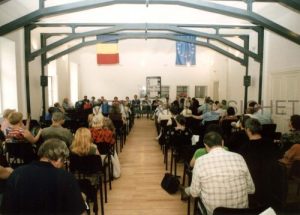 The most debated events and topics of discussion were the Soviet – Chinese conflict; the fall of the Berlin wall; nuclear arms race and the peace movement; the “cold peace”; Khrushchev’s deposition and the stagnation in Brezhnev’s era; finalisation of collectivisation in Romania; ideological freeze-up and denunciation of “revisionism”; the attempts to “re-educate” the political prisoners; the “declaration of independence” of April 1964 in Bucharest; the general amnesty of February – August 1964; the beginning of world-wide open diplomacy; the death of Gheorghiu-Dej and election of Ceausescu as leader of PMR; The Socialist Republic of Romania and the new Constitution; the cultural “thaw” and the administrative reform; the increase in the number of party members; the Great Proletarian Cultural Revolution of China; the “Prague Spring” and its repression; Romania’s position and the outset of the personality cult; the “July 1971 Theses” (the “small” cultural revolution of Bucharest).
The most debated events and topics of discussion were the Soviet – Chinese conflict; the fall of the Berlin wall; nuclear arms race and the peace movement; the “cold peace”; Khrushchev’s deposition and the stagnation in Brezhnev’s era; finalisation of collectivisation in Romania; ideological freeze-up and denunciation of “revisionism”; the attempts to “re-educate” the political prisoners; the “declaration of independence” of April 1964 in Bucharest; the general amnesty of February – August 1964; the beginning of world-wide open diplomacy; the death of Gheorghiu-Dej and election of Ceausescu as leader of PMR; The Socialist Republic of Romania and the new Constitution; the cultural “thaw” and the administrative reform; the increase in the number of party members; the Great Proletarian Cultural Revolution of China; the “Prague Spring” and its repression; Romania’s position and the outset of the personality cult; the “July 1971 Theses” (the “small” cultural revolution of Bucharest).
Among the remarkable participants in the symposium were the anticommunist fighters Doina Cornea and Vasile Paraschiv, the historians and analysts Alexandru Zub (Iasi), professor Serban Radulescu-Zoner, Marius Oprea (Bucharest), Stephane Courtois, Pierre Vallino, Michel Thomas Penette (France), Mircea Carp, Peter U. Weiss (Germany), Sanda Golopentia, Paul Michelson, Ladis Kristoff (USA), Antonina Kuzmanova (Bulgaria), Anatol Petrencu (Republic of Moldavia), Jan Willem Bos (Holland).
The final session of the Sighet Symposium was organised as a round table on the topic “1968 in Czechoslovakia and the other states of the communist camp”. Jaromir Plisek, the Ambassador of the Czech Republic, participated in the discussions and conveyed to the audience Vaclav Havel’s message of solidarity and sympathy. The President of the Czech Republic points out the importance of this type of meetings that “contribute to the conservation in the collective memory of the appalling deeds perpetrated during the period of the communist regime and to the conveyance of this warning-testimony to future generations”. Furthermore, Havel reveals the usefulness and singularity of the Sighet Memorial of Victims and Resistance to Communism, and values the role played in its creation by the writer Ana Blandiana.
It was possible to organise the symposium due to the support given by the Hanns Seidel Foundation, the Embassy of the Czech Republic in Bucharest, the Czech Centre of Bucharest, and the Polish Institute of Bucharest.








